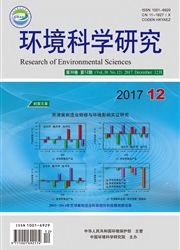

 中文摘要:
中文摘要:
选取含水率、发芽指数、C/N、水溶性碳、氨态氮5项为评价指标,运用属性识别法、灰色关联分析法、模糊综合评价法,分别对微生物接种几种不同工艺(T1为两阶段接种,T2为前阶段接种,T3为多阶段接种,CK为不接种)的堆肥腐熟度进行了评价.结果显示,在堆肥周期内3种评价方法相一致的结果是自然堆肥(CK)归入未腐熟等级、多阶段接种堆肥(T3)归入腐熟等级,表明根据堆肥温度变化情况加入多种外源微生物加速了堆肥过程中的物质转化,更有利于腐殖化的进程,提高了堆肥效率;而T1、T2处理3种评价方法给出了不同的结果.对3种评价方法进行比较显示,灰色关联分析法较模糊综合评价法、属性识别法划分幅度小、更加精准,是堆肥评价的一种较优方法.
 英文摘要:
英文摘要:
Selecting the moisture content,germination index,C/N,water-soluble carbon and ammonia as the evaluation indices,the maturity of organic waste composted with different microbial inoculation techniques(T1,two-stage inoculation;T2,first phase of inoculation;T3,multi-stage inoculation according to changes of composting temperature;CK,without inoculation) was evaluated using Fuzzy Mathematics,the Gray Relation Analysis Method,and the Attribute Recognition Theoretical Model.All of the three evaluation methods indicated that CK received an immature grade,while T3 received a mature grade.Therefore,adding inoculation agents to municipal solid waste greatly increased the rate of organic degradation,and was useful to improve composting efficiency.However,the three evaluation methods gave different results for the inoculation techniques T1 and T2.By comparing the three evaluation methods,the Grey Relational Analysis Method was shown to be better than the other two methods because of its smaller margin and higher accuracy.
 同期刊论文项目
同期刊论文项目
 同项目期刊论文
同项目期刊论文
 Study on the characteristic UV absorption parameters of dissolved organic matter extracted from chic
Study on the characteristic UV absorption parameters of dissolved organic matter extracted from chic Quantitative Fluorescence Characterization of Organic Matter Stability during Chicken Manure Compost
Quantitative Fluorescence Characterization of Organic Matter Stability during Chicken Manure Compost Impacts of different inoculation methods on fluorescence characteristics of DOM in solid waste compo
Impacts of different inoculation methods on fluorescence characteristics of DOM in solid waste compo 期刊信息
期刊信息
